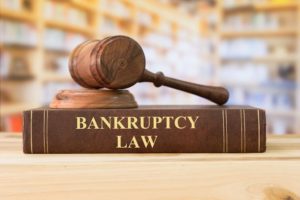Content Reviewed by:
Dave Gormley •
October.3.2022
Vertified Content
Oct 3, 2022
| Read Time: 4 minutes

That sounds scary. Like you never will have credit again if you file for bankruptcy. And maybe that was the point of the Bankruptcy Reform Act of 2005, allowing it to stay on your report for so long. No matter what kind of bankruptcy you choose, lenders will be able to see it on your credit report in the public records section. It will probably affect their decision to extend credit or they may require you to pay a higher interest rate.
Article Contents
How Long Does a Chapter 7 Bankruptcy Stay on Your Credit Report?
A Chapter 7 bankruptcy is a liquidation. Most debtors receive a Chapter 7 discharge after four to six months of filing. There are usually no payments made to creditors in Chapter 7. Thus, a Chapter 7 bankruptcy stays on your credit report for 10 years, the maximum allowed under the Fair Credit Reporting Act.
How Long Does a Chapter 13 Bankruptcy Stay on Your Credit Report?
In a Chapter 13 bankruptcy, you make payments to creditors for three to five years. You may receive a discharge once you complete the payments. Because many creditors receive repayment, a Chapter 13 bankruptcy affects your credit report for seven years. After a five-year Chapter 13 payment plan, you only have to wait two years for the bankruptcy to disappear from your credit report.
How Long Does a Bankruptcy Show on Your Credit?
If you are trying to decide if you should file for bankruptcy, the real question is not, How long does a bankruptcy remain on my credit? The more important question is, How long does it impact your credit score and your ability to borrow money?
Your credit report and score help lenders decide if they’ll give you credit or approve a loan and what interest rate to charge you. Compare the negative impacts of bankruptcy to how long it will take for your credit to recover if you keep making the minimum payments on your debt. You should also keep in mind that your reference to these debts will stay on your report for seven years from when the debt is paid off.
The real impact that filing for bankruptcy has on your credit score occurs during the first three years after you file. After that, the impact diminishes. Especially if you take steps to rebuild your credit. And even during these first three years, you can get credit. Most people are surprised by how quickly they can get a loan after bankruptcy and how quickly their credit score recovers. You may be able to get a car loan right after your bankruptcy. And you may have to wait only two years to qualify for a mortgage loan.
How Long Does a Bankruptcy Affect Your Credit?
Ever heard that radio ad, “Bring us your discharge and we will get you in a car”? This can actually happen. And some people find they can get a car loan at a better rate the day after a Chapter 7 discharge than they could have before filing. The same is true with Chapter 13. In fact, with permission from the court, you can even get a loan while in Chapter 13 bankruptcy.
Your credit score is between 300 and 850, representing one factor in your riskiness as a borrower. How quickly your credit score recovers depends on your credit score when you file and other steps you take after bankruptcy. Each credit company calculates your credit score using information from your credit report, including:
- Payment history,
- Outstanding balances,
- Length of credit history,
- New applications for credit,
- Percentage of your total credit used,
- Any bankruptcies and discharged debts, and
- Types of credit accounts (mortgages, car loans, or credit cards).
In addition to your credit score, credit agencies use many other variables to decide whether to offer credit, including the type of loan, your income, and your length of employment. Depending on these factors, you may be able to get a regular credit card within weeks or months after your case is closed. At the very least, you probably will be able to get a secured card to start rebuilding.
Why can you do this? Well, there is a bit of perhaps evil genius in this. Lenders know the law. Right after bankruptcy, the lender knows you may not have any debt. And they know if you filed Chapter 7, you can’t file another one for eight years. So if you don’t pay them back, they are at the front of the line and have eight years to collect.
How to Improve Your Credit After Bankruptcy
A bankruptcy will stay on your credit record for 7 or 10 years, but you can still work on improving your score. By adding good information to your report, you can start to restore your credit quicker. Simple ways to rebuild your credit score include:
- Following a strict budget;
- Paying your bills on time;
- Using a secured credit card, which limits the amount you can spend;
- Avoid using credit cards with revolving balances;
- Using 30% or less of your available credit;
- Saving for emergencies;
- Considering consolidating your remaining debt (for non-dischargeable debts like student loans or tax bills); and
- Monitor your credit (mistakes do happen).
Although your discharged debts remain on your credit report, they no longer affect your score like a delinquent debt. After bankruptcy, it may be your only negative mark. Thus, the more positive factors you have, the higher your score. Credit rating agencies could restore your credit score within two years.
Southern Maryland Law
While it is good to ask how long a bankruptcy will stay on your credit report, there are other questions you should ask. When deciding if you should file for bankruptcy, it is important to ask how quickly you can bounce back from bankruptcy. Then ask how quickly you can bounce back if you try a debt settlement company or the other options you have to deal with your debts.
Every bankruptcy is unique. When you speak with our lawyers, we will help you determine the best option for your situation. The attorneys at Southern Maryland Law have helped thousands of clients through bankruptcy in our thirty years in practice. We offer reasonable prices to support you on your path to debt relief. Call us today and end the anxiety of financial debt.



